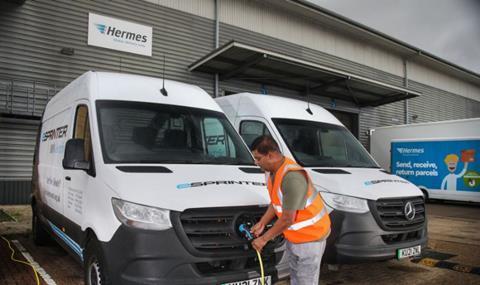
Parcel delivery firm Hermes has placed an order for 168 fully electric Mercedes-Benz eSprinters following the successful trial of two of the vehicles from its Enfield depot.
The order, which also also includes 132 diesel powered Sprinter 315 CDI variants will be supplied by Intercounty Truck & Van and Hermes has commissioned Pod Point UK to install charging points at its network of depots.
Hermes said it plans to undertake all ParcelShop collections with electric vehicles “at the earliest opportunity”, adding that its order of the diesel vans is to “tide it over” ahead of the roll out of its charging infrastructure programme and the introduction of next-generation battery-powered variants.
David Landy, Hermes head of fleet, said: “The transition to a zero-emission electric fleet is integral to our environment, social and governance agenda, and we’ve been keen to take the next, major step forward towards this goal.
“However, we are under no illusions… this will not be an easy journey. From a purely operational standpoint, and given the current state of the technology, whichever way you look at it – whether in terms of range, payload or volume – a van with an internal combustion engine beats an electric one hands down.
“Only when it comes to tailpipe emissions does the battery-powered vehicle outshine the diesel. So we know there are constraints and compromises to make, and we recognise that this is going to put extra pressure and increased demands on those colleagues out in our depots who are doing a difficult job, day in, day out.”
Read more
- Hermes donates slice of apprenticeship levy funds to wider industry training
- Hermes tackles driver shortage with new LGV apprenticeship scheme
- Hermes partners with Tesco to expand Parcelshop network
Landy added: “We’re at the very beginning of what is going to be a long and challenging process. This is new technology, so product support will be crucial. There are electric vans out there that offer a longer range than the eSprinter, but any electric vehicle is going to break down, and it’s going to do so in new ways too.”
The Mercedes-Benz eSprinter is powered by a 114 hp electric motor that drives the front wheels and will travel 95 miles on a single charge.
The vehicle is based on the L2 medium length, H2 high roof Sprinter. Its 55 kWh high-voltage battery pack is securely mounted beneath the body to give more cargo carrying space, making its 11m3 load volume identical to that of the diesel-engine, front-wheel drive stablemate, and half a cubic metre larger than its rear-wheel drive equivalent.
Landy said Hermes will face fewer operational challenges as Mercedes-Benz Vans’ zero-emission product range evolve. “This technology is moving so fast that the vehicle we’re about to start putting to work will not be the vehicle we’re still running in a year or two’s time,” he said.
“Not only does the agreement we’ve reached with Mercedes-Benz Vans mean we can swap out diesel vans for more battery-powered ones as our charging infrastructure programme progresses, but it also allows us to transition our first electric vans to new-generation versions that will cover greater distances and carry more as these become available.”
Landy added: “I like the fact that Mercedes-Benz Vans and Intercounty Truck & Van have come to us with a forward-thinking proposition that is entirely realistic about what this transition is going to entail. It’s not going to be easy, but we’re confident that we have the right partner to help us achieve our sustainability goal.”













